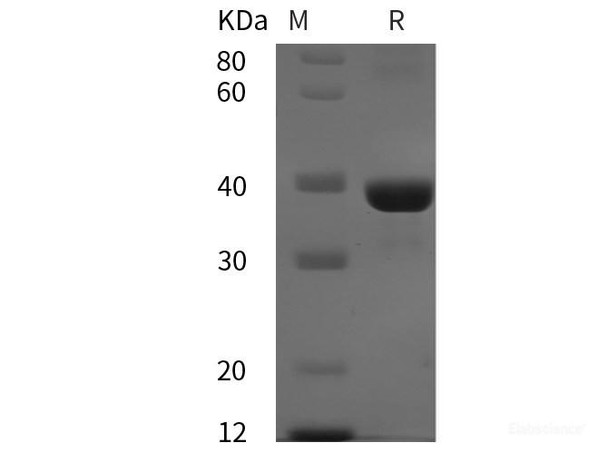Description
| Product Name: | Human cyclin D1/Ccnd1 Recombinant Protein (His tag) |
| Product Code: | RPES5529 |
| Size: | 20µg |
| Species: | Human |
| Expression Host: | E.coli |
| Synonyms: | B cell leukemia 1, BCL 1, ccnd1, Cd1, Cyl 1, G1/S specific cyclin D1, PRAD1 |
| Mol Mass: | 32.34 kDa |
| AP Mol Mass: | 39 kDa |
| Tag: | N-His |
| Purity: | > 95 % as determined by reducing SDS-PAGE. |
| Endotoxin Level: | Please contact us for more information. |
| Bio Activity: | Testing in progress |
| Sequence: | Met 1-Ile 295 |
| Accession: | P25322 |
| Storage: | Generally, lyophilized proteins are stable for up to 12 months when stored at -20 to -80°C. Reconstituted protein solution can be stored at 4-8°C for 2-7 days. Aliquots of reconstituted samples are stable at < -20°C for 3 months. |
| Shipping: | This product is provided as lyophilized powder which is shipped with ice packs. |
| Formulation: | Lyophilized from sterile PBS, pH 7.4. Normally 5 % - 8 % trehalose, mannitol and 0.01% Tween80 are added as protectants before lyophilization. Please refer to the specific buffer information in the printed manual. |
| Reconstitution: | Please refer to the printed manual for detailed information. |
| Background: | Activity of the cyclin-dependent kinases CDK4 and CDK6 is regulated by T-loop phosphorylation, by the abundance of their cyclin partners (the D-type cyclins), and by association with CDK inhibitors of the Cip/Kip or INK family of proteins. The inactive ternary complex of cyclin D/CDK4 and p27 Kip1 requires extracellular mitogenic stimuli for the release and degradation of p27 concomitant with a rise in cyclin D levels to affect progression through the restriction point and Rb-dependent entry into S-phase. The active complex of cyclin D/CDK4 targets the retinoblastoma protein for phosphorylation, allowing the release of E2F transcription factors that activate G1/S-phase gene expression. Levels of cyclin D protein drop upon withdrawal of growth factors through downregulation of protein expression and phosphorylation-dependent degradation. |






